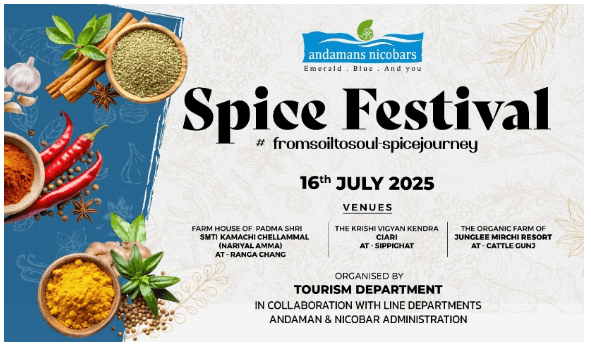Sri Vijaya Puram: From seed to plate and soil to soul, Andaman’s deep-rooted relationship with spices took centre stage at the Spice Festival 2025, hosted by the Department of Tourism on Tuesday. Designed as an immersive experience, the half-day event blended organic farming, culinary storytelling, and the spirit of slow tourism, attracting a diverse crowd ranging from agrotourism enthusiasts to local students and trainees.
As part of its ongoing seasonal events calendar, the department’s latest offering proved to be more than just a food or farm tour, it was a curated journey through the agricultural, historical, and sensory richness of the Islands’ spice legacy.
The trail kicked off with a visit to Rangachang, where the legendary Padma Shri awardee Kamachi Chellammal, better known across the region as “Nariyal Amma”, opened the gates to her spice farm. With pepper, nutmeg, cinnamon, clove and bay leaf groves whispering stories of tradition, her farm became the morning’s classroom. Participants got hands-on exposure to indigenous farming techniques and stories of resilience rooted in local soil.
From there, the group moved to KVK-CIARI, Sippighat, a hub of agri-research in the Islands. Here, scientists demonstrated modern approaches to spice cultivation, including soil conditioning, pest control, and packaging innovations. Unlike typical academic presentations, these sessions were designed to be accessible, fusing lab knowledge with field realities in a way that clicked with both farmers and visitors.
By midday, the energy shifted from field to flame at the Junglee Mirchi Organic Resort in Caddlegunj. In a setting that felt part tropical kitchen, part open-air classroom, chefs and growers teamed up to run live cooking sessions featuring turmeric, tamarind, and island-grown red chillies. Dishes were paired with explanations, not just of ingredients, but of their ecological and cultural contexts.
“Spices are not just flavours, they’re memories, remedies, and sometimes, entire economies,” said one tour guide-in-training who was part of the spice trail group. For many in the audience, especially students, the event was a revelation, connecting what they eat and what grows around them in tangible ways.
To ferry attendees, the Directorate of IP&T operated a designated spice trail bus, which not only ensured smooth travel but also served as a moving forum for informal conversations between farmers, tour operators, and trainees. Onboard, an agro-tourism enthusiast described the experience as “a living syllabus” on how the islands can market their biodiversity sustainably.
While the festival ended with the symbolic distribution of participation certificates, the larger takeaway was how heritage farming, when framed through culture and tourism, can create new economic and educational models for the Andaman & Nicobar Islands.
Officials from the Directorate of Tourism thanked the resource persons, collaborating institutions, and hosting farms for their “wholehearted support,” while hinting that this format of experience-based tourism may be replicated across other sectors in future events.
As tourists and trainees disembarked, pockets filled with peppercorns and minds buzzing with ideas, the festival left behind more than just aromas. It left a roadmap for how islands like Andaman can tell stories through soil, and invite the world to listen, taste and learn.





